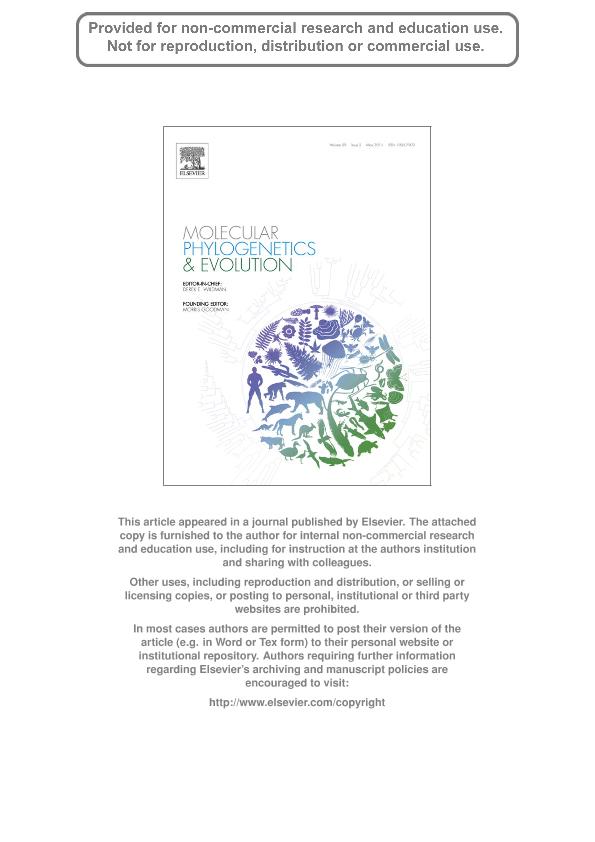Mostrar el registro sencillo del ítem
dc.contributor.author
Breitman, Maria Florencia

dc.contributor.author
Avila, Luciano Javier

dc.contributor.author
Sites, Jack W.
dc.contributor.author
Morando, Mariana

dc.date.available
2020-01-03T18:09:52Z
dc.date.issued
2011-05
dc.identifier.citation
Breitman, Maria Florencia; Avila, Luciano Javier; Sites, Jack W.; Morando, Mariana; Lizards from the end of the world: Phylogenetic relationships of the Liolaemus lineomaculatus section (Squamata: Iguania: Liolaemini); Academic Press Inc Elsevier Science; Molecular Phylogenetics and Evolution; 59; 2; 5-2011; 364-376
dc.identifier.issn
1055-7903
dc.identifier.uri
http://hdl.handle.net/11336/93440
dc.description.abstract
The Liolaemus lineomaculatus section is a geographically widely distributed group of lizards from the Patagonian region of southern South America, and includes 18 described species representing the most southerly distributed Liolaemus taxa (the genus includes 228 species and extends from Tierra del Fuego north to south-central Peru). Despite high species diversity, the phylogenetic relationships of this section are unknown. In the present work we sampled all described species in the L. lineomaculatus section as well as currently undescribed candidate species to reconstruct the first complete phylogenetic hypothesis for the clade. Our data set included four anonymous nuclear loci, three nuclear protein-coding loci, and two mitochondrial genes. We compared results obtained with three different phylogenetic methods for the concatenated data set (Maximum Parsimony, Maximum Likelihood and Bayesian Inference) with a coalescent-based species tree approach (BEST), and recovered congruent, strongly-supported topological arrangements across all methods. We identified four main clades within the L. lineomaculatus section: the lineomaculatus, magellanicus, somuncurae, and kingii+. archeforus groups, for which we estimated divergence times. We discuss the taxonomic implications of these results and how the future integration of phylogeographic, niche modeling and morphological approaches will allow testing biogeographical hypotheses in this clade.
dc.format
application/pdf
dc.language.iso
eng
dc.publisher
Academic Press Inc Elsevier Science

dc.rights
info:eu-repo/semantics/openAccess
dc.rights.uri
https://creativecommons.org/licenses/by-nc-nd/2.5/ar/
dc.subject
BEST
dc.subject
L. LINEOMACULATUS SECTION
dc.subject
LIOLAEMUS
dc.subject
LIZARDS
dc.subject
PATAGONIA
dc.subject
PHYLOGENY
dc.subject.classification
Otros Tópicos Biológicos

dc.subject.classification
Ciencias Biológicas

dc.subject.classification
CIENCIAS NATURALES Y EXACTAS

dc.title
Lizards from the end of the world: Phylogenetic relationships of the Liolaemus lineomaculatus section (Squamata: Iguania: Liolaemini)
dc.type
info:eu-repo/semantics/article
dc.type
info:ar-repo/semantics/artículo
dc.type
info:eu-repo/semantics/publishedVersion
dc.date.updated
2019-09-20T15:12:10Z
dc.journal.volume
59
dc.journal.number
2
dc.journal.pagination
364-376
dc.journal.pais
Estados Unidos

dc.description.fil
Fil: Breitman, Maria Florencia. Consejo Nacional de Investigaciones Científicas y Técnicas; Argentina
dc.description.fil
Fil: Avila, Luciano J.. Consejo Nacional de Investigaciones Científicas y Técnicas; Argentina
dc.description.fil
Fil: Sites, Jack W.. University Brigham Young; Estados Unidos
dc.description.fil
Fil: Morando, Mariana. Consejo Nacional de Investigaciones Científicas y Técnicas; Argentina
dc.journal.title
Molecular Phylogenetics and Evolution

dc.relation.alternativeid
info:eu-repo/semantics/altIdentifier/doi/https://doi.org/10.1016/j.ympev.2011.02.008
dc.relation.alternativeid
info:eu-repo/semantics/altIdentifier/url/https://www.sciencedirect.com/science/article/pii/S105579031100042X
Archivos asociados
